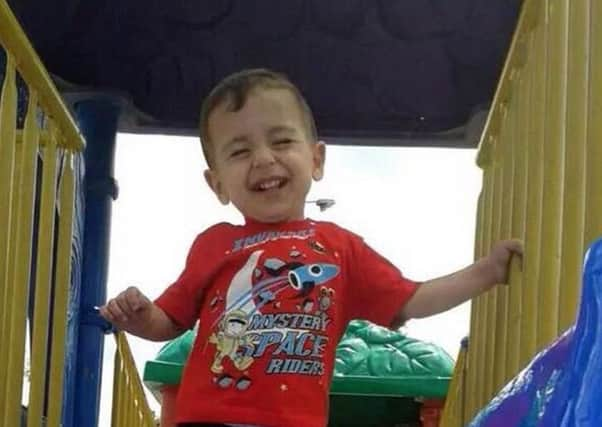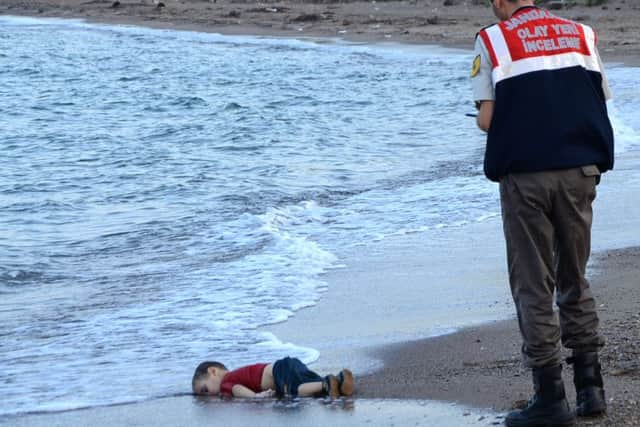Refugees like young Alan Kurdi are still dying in the Med '“ Christine Jardine


They are images from a story which, like so many others, dropped off the news agenda to make way for our hyper-focus on Brexit.
But this week they were back. For the first time in, I’m not sure how long, our TV news showed us scared and desperate people fleeing persecution on barely seaworthy boats. It’s not that people have stopped fleeing persecution in Syria or Iraq because somehow the fanatical rebel groups there or in Somalia, Eritrea and Sudan have abandoned the years of bloody struggle, brutality and executions.
Advertisement
Hide AdAdvertisement
Hide AdOr that, miraculously, every scrappy inflatable boat, over-filled with exhausted, desperate, frightened people is somehow managing to make land safely, and when it does those refugees are welcomed with open arms, can find jobs, houses and places in school for their children.


No. All that has changed is that our attention has been elsewhere. The problem has been neither been solved nor gone away. In some ways, it has got worse.
According to the group Medecins Sans Frontieres, there is now no search and rescue taking place in the Mediterranean. Only the Libyan coastguard is picking up people in its waters and taking them to detention centres.
So far this year, it is estimated that 1,277 lives have been lost, many of them children. It’s only a little over three years since public opinion in this country and across the globe was outraged by the image of a toddler – three-year-old Alan Kurdi – lying dead in the breaking waves on a Mediterranean beach.
I don’t think we are any less outraged today. One of the things that I’m proudest of about this country is our history of providing sanctuary to so many fleeing war and persecution over the years, from Jews escaping Nazi Germany to people faced with brutality in countries of the former Yugoslavia and more recently Somalia and Sudan. And I’m proud of the fact that we were one of the founding signatories to the UN Geneva Convention on Refugees.
But when those hopeless faces of refugees off the Kent coast appeared on my TV screen this week, I had a moment of doubt. I’m not convinced we are currently living up to the reputation of those previous generations.
Are those people who have risked their lives and given up everything they own about to be disillusioned by the very country they have pinned all their hopes on? And ironically could we be missing an economic benefit through a mis-placed, and previously unacceptable, fear of newcomers? Newcomers with as valuable a contribution to make as my Irish great-grand parents or the thousands of Italian immigrants who so enriched our culture.
Every week I hear from refugees and asylum seekers that their dream is simply safety. A roof over their head and a job to feed and clothe their family. But right now, those people, many of whom do have valuable skills and experience to offer, are being stripped of their dignity and condemned to an existence on the very periphery of our society.
Advertisement
Hide AdAdvertisement
Hide AdInstead, why don’t we recognise the contribution they could make and lift the ban on genuine asylum seekers from working? Allow them to seek employment after three months of claiming sanctuary, while their case is progressed?
Currently, you have to have been seeking asylum for more than 12 months and be able to fill one of a very narrow list of highly specialised jobs. The system is so enormously complicated that often even the Government has no clue who has applied, or whether anyone has found work. Of course, it is very possible that many asylum seekers may be too traumatised to work immediately. That is a different issue.
But opening up the right to employment after three months would be an immediate route towards integration into local communities. It would help people to learn English and allow them to contribute to society – all things asylum seekers tell us they badly want to do.
And there is the positive economic benefit I mentioned. In Scotland, that is two-fold. In a small country, which has always depended on waves of immigration, we know the long-term picture can be positive. Those new citizens help our demographics and ensure that we have a strong workforce to keep our economy buoyant and maintain the socially cohesive society from which we all benefit. Our population, at the moment, is not growing fast enough. We need more people.
But let’s also consider how much allowing asylum seekers to work could save the taxpayer. The Home Office currently organises accommodation and financial support for claimants and their families until a decision is reached.
The All-Party Parliamentary Group on Refugees has estimated that the Government spends between £70 million and £100 million a year on housing and supporting asylum seekers who could otherwise be working, earning, and fending for themselves. To me, it’s a no brainer. Instead of giving people hand-outs, let them work and contribute.
But the problem goes deeper than employment restrictions. From housing to access to education, the UK’s system for supporting people waiting to have their asylum claims heard is chaotic and unwelcoming. The infamous “hostile environment” is no respecter of the great trauma and suffering that many of these people have been through. The system is riddled with nasty, unfair elements that the Government continues to defend.
For LGBT+ applicants, there can be a culture of disbelief about their sexuality; for Christian converts, the Home Office appears astonishingly unsympathetic; for children wanting their parents to join them, our Government is inexplicably opposed to following the rest of Europe in allowing wider family reunification.
Advertisement
Hide AdAdvertisement
Hide AdSurely, it’s time we started looking through the looking glass the other way. These are people, fleeing persecution, looking for a safe life in a country they respect who could, like previous immigrants, bring their skills to bear in contributing to our health service, our economy and our society. They come here because of our traditions of freedom, of openness, tolerance and generosity.
Let’s not be the generation to lose sight of that.
